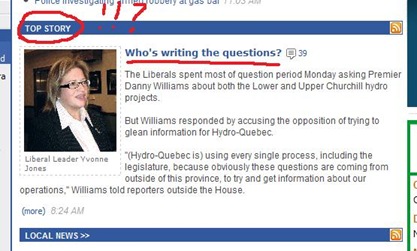As a rule, you don’t enhance your credibility by saying things which are demonstrably at odds with established facts.
Take for example a news release just issued by the provincial government’s energy company. It reads like something from Hisself for polling season, not Ed Martin, but that’s another issue.
Just get a load of this bit:
Currently, there is a surplus of transmission capacity on the transmission grid which Hydro-Québec TransÉnergie was obligated to offer to Newfoundland and Labrador Hydro, a subsidiary of Nalcor Energy, under the Open Access Transmission Tariff (OATT), before suggesting more expensive upgrades. The surplus was never offered to Nalcor Energy. Instead, Nalcor was told it would have to pay for upgrades that were not required.
The most obvious problem for this is that NALCOR was not seeking to move energy today. They wanted to option a block of power for 30 years to service a project which, as everyone knows, doesn’t even exist. As such, any current surplus – no pun intended – is irrelevant.
The studies for the future demand showed that capacity will be needed down the road a ways to handle the power coming from a project which still exists only in the over-wrought imaginations of the Old Man and his entourage.
Not surprisingly, though, this extra capacity would be exactly the sort of thing which – as NALCOR’s release confirms – both the company and the Premier have said repeatedly they’d be prepared to pay for whether it was in Quebec or New Brunswick.
So why is Ed Martin issuing news releases late on a Friday tilting at imaginary windmills?
Aside from desperately trying to ignite some distraction from the Expropriation FUBAR Follies or giving your humble e-scribbler yet more to ridicule, only the Old Man likely knows for sure.
But let us assume, for a second, that there is a surplus currently and NALCOR is willing to buy space today or was willing to scarf it up at any time back to 2006 when they first stuck in their request.
As part of the ongoing discussion they could have worked out a deal with Hydro Quebec at any point. In fact, once the capacity studies were done, they had 45 days to either close the deal or merely indicate their intention to buy.
They didn’t do that.
Instead they started a round of procedural motions in front of the Quebec energy regulatory board.
Then after a couple of years of wrangling, they have managed to lose every single one of the five motions they brought. They lost them not because the process was biased but because the motions themselves - like this release - lacked merit and substance.
After all, if there is capacity on the line and if there was a project and if NALCOR was ready and willing to pay to get power to market, the company would have optioned the space rather than tried to stop the clock.
Since they haven’t optioned the space, then anyone with two clues can draw a logical conclusion.
Res ipsa loquitur, as the lawyers would say.
The facts speak for themselves.
-srbp-
